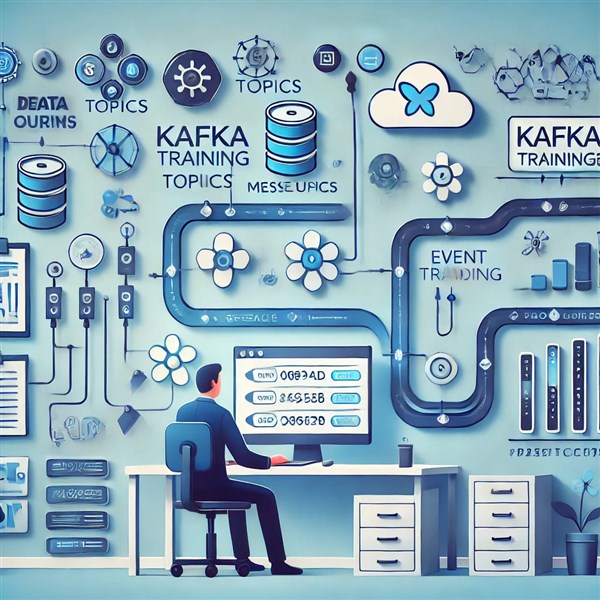Unable to find what you're searching for?
We're here to help you find it
As organizations embrace digital transformation and real-time decision-making, the need for high-performance data pipelines is growing rapidly. Apache Kafka, an open-source distributed event streaming platform, has emerged as a powerful solution for managing real-time data across applications, systems, and environments.
From large enterprises to startups, Kafka is used to handle everything from event-driven architectures and log aggregation to stream processing and microservices communication. With its widespread adoption, the demand for professionals skilled in Kafka has skyrocketed, making Kafka training a valuable investment for developers, data engineers, DevOps professionals, and IT architects.
In this blog, we explore the top skills you'll gain from a Kafka training course, and how these skills can help you build scalable, reliable, and real-time data solutions for your organization or career advancement.
Any comprehensive Kafka training course begins with a deep dive into its distributed architecture. You’ll learn how Kafka is designed for horizontal scalability, fault tolerance, and high throughput, which makes it ideal for processing massive streams of data in real-time.
Skills You’ll Learn:
Understanding the architecture is essential for building efficient and reliable Kafka deployments, whether in development or production environments.
One of the most important hands-on skills you'll gain is how to create Kafka producers and consumers to send and receive messages in real time.
Key Learning Outcomes:
These skills are foundational for developers working in streaming data pipelines, real-time analytics, and event-driven systems.
Topics are the logical channels where Kafka stores streams of records. Partitions, on the other hand, allow Kafka to distribute data for scalability and fault tolerance.
Training Will Cover:
Learning to manage topics efficiently ensures that your Kafka environment can scale to meet high-throughput requirements without performance degradation.
Kafka offers a range of configurations that affect performance, durability, and latency. A training course will teach you how to fine-tune Kafka settings to optimize performance based on your use case.
You’ll Learn:
This skill is essential for real-time applications, where performance bottlenecks can lead to significant delays or data loss.
In enterprise environments, Kafka is rarely used on a single node. Setting up and maintaining a Kafka cluster is a crucial skill for DevOps engineers and system administrators.
Kafka Training Teaches You To:
You’ll be able to deploy Kafka on-premises, in containers, or in the cloud, depending on your organization's infrastructure.
Security is a critical component of any enterprise-grade deployment. Kafka supports several authentication, authorization, and encryption mechanisms.
What You’ll Learn:
These practices help protect sensitive data and comply with regulatory requirements like GDPR, HIPAA, and PCI-DSS.
Many Kafka training courses cover Kafka Streams, a Java library used to build real-time data processing applications that consume, process, and output Kafka data.
Skills You’ll Gain:
Stream processing is essential for real-time dashboards, fraud detection systems, and event monitoring applications.
Kafka Connect simplifies data integration by providing connectors for common data sources like databases, file systems, cloud services, and more.
Course Highlights:
This makes Kafka training ideal for data engineers involved in data warehousing, analytics, and cloud data migration.
Efficient monitoring and troubleshooting are vital for Kafka’s high availability and performance.
You’ll Learn:
These skills ensure you can keep your Kafka environment stable, scalable, and reliable.
Many courses also prepare you for popular Kafka certification exams, such as:
You’ll receive:
Certification validates your skills and helps you stand out in the job market as a Kafka professional.
Kafka training is ideal for:
Conclusion
A Kafka training course equips you with a wide range of technical skills that are in-demand across industries—from banking and healthcare to retail and tech. With real-time processing at the heart of today’s digital economy, mastering Kafka opens doors to high-paying roles in data engineering, software development, and cloud computing.
Whether you're learning Kafka to support streaming analytics, build microservices, or manage enterprise-scale data pipelines, the skills covered in training will ensure you're ready to build robust, scalable, and future-ready solutions.
In today's data-driven world, Apache Kafka is a tool that can't be ignored. Whether you're a developer, a data analyst, or someone interested in big data, a Kafka training course can equip you with the skills needed to stay ahead of the curve. Koenig Solutions, a leading IT training company, provides certification in top technology courses, including Apache Kafka, helping professionals enhance their skills and boost their careers.

Aarav Goel has top education industry knowledge with 4 years of experience. Being a passionate blogger also does blogging on the technology niche.










